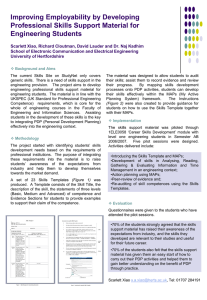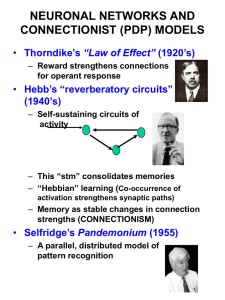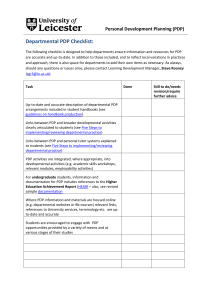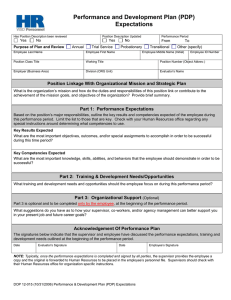A meeting of the Professional Development Programme Task and Finish... July 2013 at 10.00am in the Ted Wragg Room, Northcote... Professional Development Programme Task and Finish Group
advertisement
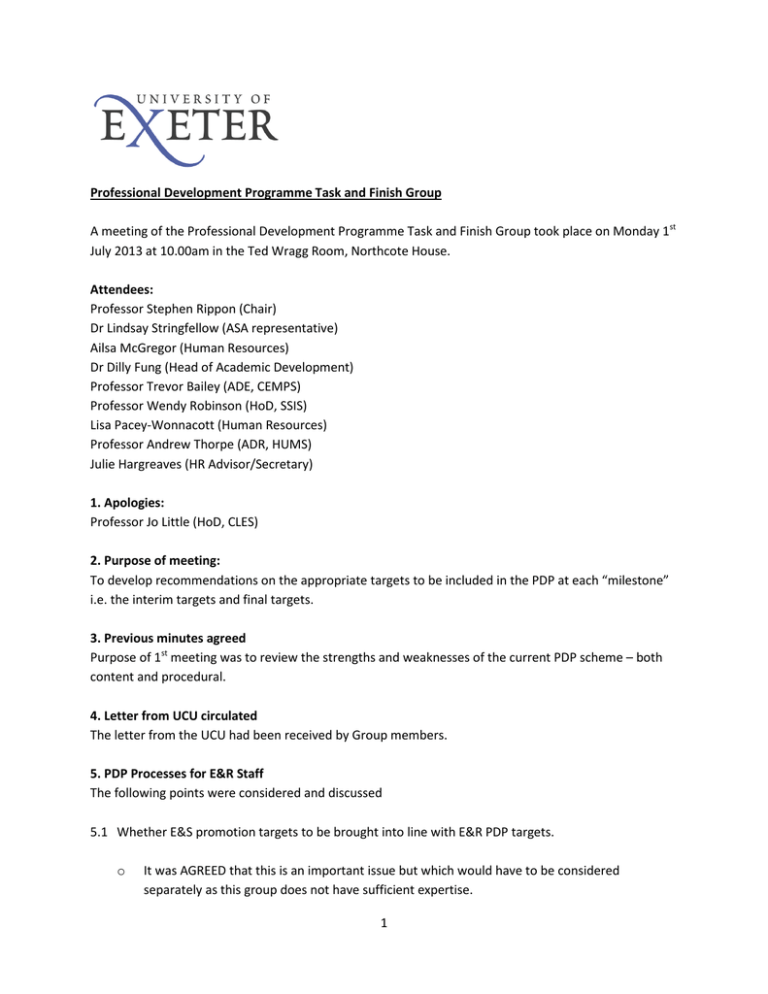
Professional Development Programme Task and Finish Group A meeting of the Professional Development Programme Task and Finish Group took place on Monday 1st July 2013 at 10.00am in the Ted Wragg Room, Northcote House. Attendees: Professor Stephen Rippon (Chair) Dr Lindsay Stringfellow (ASA representative) Ailsa McGregor (Human Resources) Dr Dilly Fung (Head of Academic Development) Professor Trevor Bailey (ADE, CEMPS) Professor Wendy Robinson (HoD, SSIS) Lisa Pacey-Wonnacott (Human Resources) Professor Andrew Thorpe (ADR, HUMS) Julie Hargreaves (HR Advisor/Secretary) 1. Apologies: Professor Jo Little (HoD, CLES) 2. Purpose of meeting: To develop recommendations on the appropriate targets to be included in the PDP at each “milestone” i.e. the interim targets and final targets. 3. Previous minutes agreed Purpose of 1st meeting was to review the strengths and weaknesses of the current PDP scheme – both content and procedural. 4. Letter from UCU circulated The letter from the UCU had been received by Group members. 5. PDP Processes for E&R Staff The following points were considered and discussed 5.1 Whether E&S promotion targets to be brought into line with E&R PDP targets. o It was AGREED that this is an important issue but which would have to be considered separately as this group does not have sufficient expertise. 1 5.2 The general consensus from the Deans (as previously reported by Robert Van de Noort) is that the current system does not work; targets are unreasonable and 5 years is too long. Competency can be assessed over 2 or 3 years. • Employment law issues including employees’ accruing the right to bring a case of unfair dismissal after two years’ service and how this might impact any probation or performance management processes. • The disaggregation of Probation from Promotion within the PDP. The PDP should be the opportunity to assess a Lecturer’s competence in their role with the end result being confirmed in post. o It was AGREED that there was a need to disaggregate passing a period of probation from promotion to Senior Lecturer. 5.3 One option if Probation and Promotion were disaggregated, is that the five year timescale could remain, but with the first 2 years of this as the probationary period within which competency is evaluated, followed by a further 3 years when suitability for engagement as Senior Lecturer is assessed. • The Group felt that one problem with the current system was the uncertainty and instability it caused Lecturers within PDP/Probation and that a 2 year probationary period, followed by a 3 year period of assessing the suitability for promotion to SL, would alleviate this. • It was acknowledged, however, that it was more difficult to produce enforceable quantified targets (eg for grant income, and the production of a series of outputs over a sustained period of time) over a short probation period, but that this shorter period would be less stressful for the vast majority of staff who perform excellently. • The Group supported the idea that Lecturers who exceeded their targets could be promoted at any time without having to wait for the 5 year period to expire. • It was agreed that there needed to be solid and measurable targets within both the interim (2 year) and final (3 year) stages of PDP and that all staff must be made aware that they must continue to develop and move forward otherwise the performance management mechanism would fall into place. • There was agreement that it is important to reduce negativity surrounding the current PDP process and use this review as an opportunity to embed a culture of staff development and progression. A change of process name, moving away from PDP was discussed as the general feeling is that the term is tainted o It was AGREED that the preferred way forward was for a two year Probationary period followed by a further three years at the end of which a member of staff would be expected to reach a Senior Lectureship. 5.4 If the initial probationary period is going to be one year shorter, then the targets need to be clear, concise, measurable, and competency based. 2 o The Group discussed the importance of a staff member fulfilling both Teaching and Research elements of the PDP. There should be no option to “balance” one with the other, i.e even if someone comes in with a large grant, whatever the proportion of teaching (even if limited), it must be of excellent quality. o It was AGREED that the targets for passing probation must include both Teaching and Research with no balancing applying between them. 5.5 HEA Fellowship and PCAP must be part of the 2 year initial probationary process. It is currently possible to do the PCAP in 1 or 2 years, although many staff members do not complete it until 3 years). There was consensus, however, that Lecturers should not be able to complete their probation without PCAP. o o It was AGREED that passing PCAP should be a condition of passing Probation (in addition to the Teaching and Research targets) It was AGREED that all College SWARM workload allocations should include 300 hours over two years for completing PCAP 5.6 The Group AGREED that there should be three target headings: • Teaching, • Research • PCAP o 6. It was AGREED that each of these should include targets to encapsulate subjects such as outreach, service to the community, contribution to the University. Consideration of Targets It was suggested that targets could be re-drafted as follows: Research: • Outputs: at least 1 output submitted within 2 years and of at least 3* standard; not previously published • Grants: a narrative from the ADR explaining satisfactory engagement and involvement in grant funding applications that show clear evidence of having been fundable • Impact: a credible narrative from the staff member outlining an impact plan • PGR: where possible, satisfactory supervision of one or more research students, attendance at new supervisor’s workshop, and correct use of “My PGR”) Teaching: these targets could be structured around the UK Professional Standards Framework • The design and planning of teaching 3 • • • • • • • • • • • Teaching and the support of learning (as assessed satisfactory reports from Peer Dialogue and perhaps MACE evaluations) Management of a programme or module (designing and planning learning activities) Assessment and giving feedback (including the return of coursework within the University’s prescribed time) Developing an effective learning environment Engagement in CPD (this is addressed through PCAO) the relevance of MACE scores and whether this could potentially be a useful tool to gauge individual teaching performance was discussed. All agreed that there needs to be a mechanism put into place to deal with performance issues not falling into these categories, for example lateness. It was agreed that a skeleton framework and outline of targets, timescales and recommendations ready for the next meeting. It was agreed that some consideration is required of the impact of any change to the PDP might have for people currently going through various stages of their PDP? It was agreed that although consideration of whether E&S promotion targets could or should be brought into line with E&R PDP targets is outwith the remit of this Group that this is likely to be one of the recommendations the Group wishes to make. ACTIONS: • • • • AMcG to provide other comparable Russell Group members’ data (collected as part of the Athena Swan project) for circulation to the Group LPW to look at Leavers’ data to identify any trends among PDP Lecturers UCU be requested to provide further data on leavers following comment in their letter. Based on the discussions at the meeting, colleagues in Human Resources to prepare a draft skeleton framework and outline of targets, timescales and recommendations ready for consideration at the next meeting. Date of Next Meeting 10.30am, Tuesday 17 September 4
